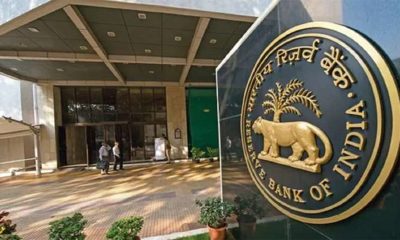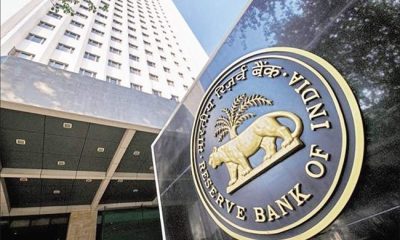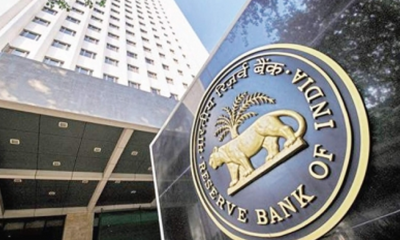Business
As Restructuring 2.0 window closes, less than 1% of eligible companies opt
With the window for restructuring under the Resolution Framework 2.0 of the Reserve Bank of India closing on September 30, there was minimal utilisation of it as anticipated.
Less than 1 per cent of the eligible companies opted to restructure their debt through the facility.
The tepid response “despite an intense and more virulent second wave of the Covid-19 pandemic” reflects the positive turn in demand outlook, and anxiety about negative stakeholder perception of restructured companies.
To assess the extent of recovery in demand and the resilience of sectors, CRISIL Ratings uses a propriety framework. This tracks resilience across 43 sectors that account for 76 per cent of the total corporate debt rated by the agency.
The exercise indicated that 37 sectors have seen demand rebounding to, or near, the pre-pandemic levels. The impact of the second wave on the cash flows of companies has been relatively short-lived due to localised and less-stringent restrictions compared to the first wave.
Says Subodh Rai, Chief Ratings Officer, CRISIL Ratings, “Around 88 per cent of the rated debt under the framework is in sectors where demand has or is expected to fully recover in current fiscal to the pre-pandemic levels. These include essentials such as FMCG, pharma and telecom, and infrastructure-linked sectors such as cement, power, roads and construction. Such a broad-based recovery has helped reduce the need for restructuring among corporates…”
Also, the continuation of strong government support “such as the expansion of the scope of the Emergency Credit Line Guarantee Scheme (ECLGS) and its extension till March 31, 2022” has helped companies manage temporary liquidity disruptions.
This is especially true for micro and small enterprises, which are experiencing relatively higher stress. ECLGS reduces the need for them to go for Restructuring 2.0.
The impact on long-term credit history also kept away many companies. That is because lenders would classify their accounts as restructured, which would impair their ability to raise debt in future.
None of the CRISIL-rated companies opting for Restructuring 2.0 had a rating in the investment-grade category (BBB or higher), where credit profiles are relatively stronger. Even among the companies in the sub-investment grade category (BBB or lower) “where weaker credit profiles abound” a significant, 98 per cent did not seek restructuring.
It is pertinent to note that these findings are limited to CRISIL-rated companies, which are largely mid to large sized. Hence, they may not reflect the predicament of micro and small enterprises, very few of which are rated in any case.
In the road ahead, a third wave of the pandemic, if it lands, and its impact will bear watching.
Business
Nifty to touch 29,094 in 12 months supported by durable earnings, strong macro backdrop

New Delhi, Dec 19: India’s benchmark index Nifty is expected to touch 29,094 in one year based on long‑term valuation averages and earnings durability, a report said on Friday.
Wealth management firm PL Wealth said in the report that India enters the end of 2025 from a position of relative macro strength with record‑low inflation, a dovish monetary stance, resilient domestic demand and improved corporate earnings visibility.
“In the near term, large-cap stocks remain preferred due to their earnings stability and strong balance sheets, while selective exposure to high-quality mid-cap names is being added as visibility improves,” the wealth management firm cited its strategy.
Over the next 6 to 24 months, the earnings cycle is expected to broaden across consumption, financials, capex-linked sectors and select industrials, supported by benign inflation, lower interest rates and sustained domestic liquidity.
“India’s current macro configuration is among the most constructive we have seen in over a decade,” said Inderbir Singh Jolly, CEO, PL Wealth Management.
While global uncertainties will continue to create short-term volatility, India’s structural strengths—policy reform, financialisaton of savings and improving corporate balance sheets—position it well for sustained long-term growth, Inderbir added.
RBI’s 25 basis‑point cut to a 5.25 per cent policy repo rate lowered its CPI inflation projections and upgraded GDP growth estimates, signalling confidence in the sustainability of domestic demand, the report said.
The firm also noted FY26 GDP growth projection of 7.3 per cent underpinned by robust infrastructure spending, resilient consumption and key policy measures such as GST rationalisation and income-tax cuts.
The FY26 September quarter earnings season delivered broad-based strength, with several sectors—including hospitals, capital goods, cement, electronics manufacturing services, ports, NBFCs and telecom—reporting double-digit growth in EBITDA and profits.
The firm noted that Nifty earnings per share estimates for FY26–FY28 imply an earnings CAGR of nearly 14 per cent. Domestic institutional investors have anchored markets with record net inflows of over Rs 6.8 trillion year‑to‑date.
Business
Indian stock markets open higher amid positive global cues

Mumbai, Dec 19: Indian stock markets opened on a positive note on Friday, taking cues from supportive global markets, even as benchmark indices remained on track to close the week in the red for the third consecutive session.
In early trade, the Sensex was trading at 84,866.06, up 384.25 points or 0.45 per cent at around 9:20 AM.
The Nifty index was also higher, quoting at 25,926.90, up 104 points or 0.4 per cent. The index continues to trade within the 25,700–25,900 range, reflecting trader indecision.
“Immediate resistance is placed at 25,900–26,000, while key supports are seen at 25,700 and 25,600,” analysts said.
Buying interest was seen in several heavyweight stocks. Shares of TMPV, Eternal, Infosys, Power Grid, BEL, Sun Pharma, and Bajaj Finserv gained up to 1.5 per cent and emerged as the top performers on the Sensex.
On the other hand, ICICI Bank and Bharti Airtel were the only stocks trading in the red during early deals.
Sectorally, all indices were trading higher. The Nifty Healthcare index led the gains, rising 1.14 per cent, followed closely by the Nifty Pharma index, which was up 1.1 per cent.
The Nifty Auto index also gained around 0.5 to 0.57 per cent.
The broader markets mirrored the positive sentiment, with the Nifty Midcap index gaining 0.45 per cent, while the Nifty Smallcap index was up 0.47 per cent.
Meanwhile, investors remain cautious ahead of several key global and domestic triggers.
Globally, market participants are keeping an eye on retail sales data from the UK, wage tracker data from the euro area, and the US Federal Reserve’s balance sheet numbers. On the domestic front, investors are awaiting the Reserve Bank of India’s Monetary Policy Committee meeting minutes and the latest foreign exchange reserve data.
In terms of institutional activity, foreign institutional investors turned net buyers, purchasing shares worth Rs 614.26 crore on Thursday.
Domestic institutional investors also supported the market, with net purchases of Rs 2,525.98 crore during the same session.
Business
India reaches 709 million active UPI QRs, logs 59.33 billion transactions in July-Sep

Mumbai, Dec 18: The unified payments interface (UPI) transaction volumes rose 33.5 per cent (year-on-year) to 59.33 billion transactions in the July-September period, as transaction value grew 21 per cent to Rs 74.84 lakh crore, a report showed on Thursday.
India reached 709 million active UPI QRs, marking a 21 per cent increase since July 2024. Dense QR acceptance across kiranas, pharmacies, transport hubs, and rural markets has made scan-and-pay the default payment mode nationwide, according to the report by Worldline India.
Person-to-merchant (P2M) transactions continued to outpace person-to-person (P2P), reflecting UPI’s dominance in everyday retail payments.
P2M transactions were up 35 per cent to 37.46 billion transactions while P2P transactions rose 29 per cent to 21.65 billion transactions, the report said.
The third quarter (Q3 2025) further reinforced India’s position as the world’s most dynamic real-time payments economy — where every scan, tap, and click is reshaping consumer and merchant behaviour.
The average ticket size declined to Rs 1,262 (from Rs 1,363), highlighting increased usage for micro-transactions such as mobility, food, healthcare essentials, and hyperlocal commerce.
Point of sale (PoS) terminals grew 35 per cent to 12.12 million (July 2024–July 2025). Bharat QR stood at 6.10 million, witnessing marginal decline amid the shift toward UPI QR dominance.
Private banks led acceptance deployment, accounting for 84 per cent market share. While credit card issuance grew by 8 per cent (on-year) to 113.39 million cards, debit cards reached 1.02 billion and prepaid cards stood at 470.1 million.
Credit card transactions grew 26 per cent to 1.45 billion, with transaction value at Rs 6.07 lakh crore. Debit card transactions declined 22 per cent, reflecting migration of low-ticket spends to UPI, the report showed.
Mobile and tap-based payments continued to accelerate, with contactless adoption gaining momentum across metros, mobility services, and quick-service retail.
“The outlook for Q4 2025 and early 2026 points to accelerated innovation and deeper ecosystem integration. Interoperable QR is expected to move from pilot phases to everyday usage across mobility, healthcare, fuel stations, and public utilities—delivering a unified scan-and-pay experience,” the report mentioned.
-

 Crime3 years ago
Crime3 years agoClass 10 student jumps to death in Jaipur
-

 Maharashtra1 year ago
Maharashtra1 year agoMumbai Local Train Update: Central Railway’s New Timetable Comes Into Effect; Check Full List Of Revised Timings & Stations
-

 Maharashtra1 year ago
Maharashtra1 year agoMumbai To Go Toll-Free Tonight! Maharashtra Govt Announces Complete Toll Waiver For Light Motor Vehicles At All 5 Entry Points Of City
-

 Maharashtra1 year ago
Maharashtra1 year agoFalse photo of Imtiaz Jaleel’s rally, exposing the fooling conspiracy
-

 National News1 year ago
National News1 year agoMinistry of Railways rolls out Special Drive 4.0 with focus on digitisation, cleanliness, inclusiveness and grievance redressal
-

 Maharashtra1 year ago
Maharashtra1 year agoMaharashtra Elections 2024: Mumbai Metro & BEST Services Extended Till Midnight On Voting Day
-

 National News1 year ago
National News1 year agoJ&K: 4 Jawans Killed, 28 Injured After Bus Carrying BSF Personnel For Poll Duty Falls Into Gorge In Budgam; Terrifying Visuals Surface
-

 Crime1 year ago
Crime1 year agoBaba Siddique Murder: Mumbai Police Unable To Get Lawrence Bishnoi Custody Due To Home Ministry Order, Says Report


















